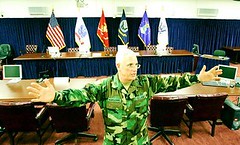Tag: Military commissions (page 2)

Omar Khadr, the Canadian captured as a teen on the battlefield in Afghanistan, has a hearing today in his military commissions proceeding at Guantanamo.
Most human rights and legal experts say the evidence against Khadr seems too weak to be able to hold up in a US civil court or an ordinary military tribunal.
Khadr could then become the first beneficiary of the closing of the Guantanamo detention facility.
The ACLU is monitoring from Gitmo. [More...]
(6 comments, 236 words in story) There's More :: Permalink :: Comments
The U.S. today moved to dismiss the cases of five Guantanamo detainees facing criminal charges: Binyam Mohamed, Noor Uthman Muhammed, Sufyiam Barhoumi, Ghassan Abdullah al Sharbi and Jabran Said Bin al Qahtani.
Clive Stafford Smith, a civilian attorney representing one of the five, Binyam Mohamed, said he has already been notified that charges against his client will be reinstated. "Far from being a victory for Mr. Mohamed in his long-running struggle for justice, this is more of the same farce that is Guantanamo," Stafford Smith said. "The military has informed us that they plan to charge him again within a month, after the election."
Army Lt. Col. Bryan Broyles, who represents another of the five detainees, said the military might be preparing the tribunals to face increased scrutiny following next month's presidential election. John McCain and Barack Obama have both said they want to close Guantanamo Bay.
The Government's less than credible explanation: [More...]
(1 comment, 434 words in story) There's More :: Permalink :: Comments
The military jury in the trial of Guantanamo Detainee and Osama bin Laden driver Salim Hamdan reached a split verdit: Guilty of terrorism, not guilty of conspiracy.
Sentencing is expected to take place this afternoon. Life in prison is on the table. Hamdan cried as the verdict was read. His lawyers point out the inherent unfairness of the military tribunal trial process:
Hamdan's attorneys said the judge allowed evidence that would not have been admitted by any civilian or military U.S. court, and that interrogations at the center of the government's case were tainted by coercive tactics, including sleep deprivation and solitary confinement.
Unfair trials rob the public of the ability to trust in the integrity of the verdict. Guantanamo has been a failure and a black mark on America since day one. After the War in Iraq, this will be the biggest stain on the legacy of George W. Bush. Worst President Ever.[More...]
(8 comments, 523 words in story) There's More :: Permalink :: Comments

The military commissions trial of Salim Hamdan, driver for Osama bin Laden, went to the jury today.
Hamdan never testified in his defense across two weeks of trial testimony. But unlike suspects on U.S. soil... Hamdan had no right to an attorney or right against self-incrimination during 18 months of military and civilian interrogations from Afghanistan to Guantánamo.
In closing arguments:
[T]he Pentagon cast bin Laden's driver as an al Qaeda insider and the defense called him a Sept. 11 scapegoat. "He's an al Qaeda warrior. He has wounded, and the people he has worked with have wounded the world," prosecutor John Murphy told the jury. "You are the conscience of the community."
Countered Navy Lt. Cmdr. Brian Mizer, on behalf of the $200-a-month driver: "We will capture or kill Osama bin Laden some day. You should not punish the general's driver today with the crimes of the general."
By the numbers: There were only 10 media members in attendance on the last day of testimony. It took a Pentagon airlift to get most of them there at all.
(4 comments) Permalink :: Comments
The military commission trial of Osama bin Laden's driver, Salim Hamdan, got underway today.
The Judge barred the prosecution from introducing statements Hamdan made while detained at Bagram AFB in Afghanistan because they were the product of overly coercive techniques.
The judge said the prosecution cannot use a series of interrogations at the Bagram air base and Panshir, Afghanistan, because of the "highly coercive environments and conditions under which they were made."
At Bagram, the judge found Hamdan was kept in isolation 24 hours a day with his hands and feet restrained, and armed soldiers prompted him to talk by kneeing him in the back. His captors at Panshir repeatedly tied him up, put a bag over his head and knocked him the ground.
Other rulings: [More...]
(8 comments, 1298 words in story) There's More :: Permalink :: Comments
Via McJoan at Daily Kos, I see that the Pentagon announced today that William J. Haynes, II has resigned as the chief counsel of the Department of Defense.
As we noted last week, Haynes is the guy who told Morris Davis, the former chief prosecutor at Guantanamo, that the Administration couldn't handle any acquittals in the military commission trials. Haynes was responsible for oversight of the tribunal process.
Haynes was also a Bush judicial nominee for the 4th Circuit Court of Appeals. He was widely opposed, in no small part for his hand in the Bush Adminsitration's much-criticized military interrogation policies. Democrats refused to confirm him. Here's more on his failed confirmation hearing.
One more: People for the American Way: Keep Haynes Off the Federal Bench. The Pentagon announcement says he's going back to private life. That's a relief.
(3 comments) Permalink :: Comments

What do we have here -- show trials just in time for the November elections, to help out the Republican nominee? (hat tip to reader Scribe.)
Military prosecutors will seek the death penalty for six detainees at Guantanamo.
Update: The ACLU says the system is flawed.
Via Sebastian Meyer: The U.S. reasoning for the 6 death penalty cases sought in Guantánamo is based on the Geneva Conventions, the very document the U.S. claims does not apply in this case.
Update: The Center for Constitutional Rights which represents one of the six designated for execution is challenging the validity of military comissions and use of torture evidence in death penalty cases.
(15 comments) Permalink :: Comments


Update: C-Span 3 is stream and playing the audio of the hearing now (11:44 am ET). The AP now has a report, Justices Grill Detainees' Lawyer, on how the arguments went.
The Supreme Court today is hearing oral arguments in the consolidated cases of Boumediene v. Bush and Al Odah v. U.S., 06-1196 regarding the rights of Guantanamo detainees to challenge the legality of their confinement in federal courts.
Lawyers for the foreign detainees contend the courts must step in to rein in the White House and Congress, which changed the law to keep the detainee cases out of U.S. courts after earlier Supreme Court rulings. The most recent legislation, last year's Military Commissions Act, strips federal courts of their ability to hear detainee cases.
Solicitor General Paul Clement, representing the administration, said foreigners captured and held outside the United States "have no constitutional rights to petition our courts for a writ of habeas corpus," a judicial determination of the legality of detention.
The Court may have to determine whether Guantanamo Bay in Cuba is really on U.S. soil. [More...]
(3 comments, 316 words in story) There's More :: Permalink :: Comments


I'll believe it if it happens, but according to the New York Times, Bush administration officials are discussing providing more legal rights to the Guantanamo detainees it seeks to hold as enemy combatants.
The discussions are described as a step on the road to closing Gitmo. Why the change of heart? The Administration may be fearful the next case the Supreme Court decides will be too generous to the detainees.
The administration has fought for years in court and in Congress against granting the detainees more rights. In the latest instance, the Supreme Court is to consider a case brought by Guantánamo detainees who are seeking to challenge their confinement in habeas corpus suits in federal court.
If the administration loses that case, it could give the detainees even more legal rights and create a precedent limiting the president’s and the military’s power. Lawyers inside and outside of government said a detailed proposal from the administration to give detainees fuller legal protections could convince the justices that they need not resolve the case, Boumediene v. Bush.
More...
(3 comments, 448 words in story) There's More :: Permalink :: Comments
The Center for Constitutional Rights has filed what it says is a "groundbreaking brief" (available here) on behalf of Guantanamo detainees.
On August 24, 2007, Center for Constitutional Rights (CCR) attorneys and co-counsel submitted a ground-breaking brief to the Supreme Court in the case that will determine whether detainees at Guantánamo possess the fundamental constitutional rights to due process and habeas corpus.
The brief was filed on behalf of men from the first habeas corpus petitions submitted immediately after the landmark 2004 Supreme Court decision in CCR's case Rasul v. Bush. Al Odah v. United States, as the case is now called, has been consolidated with a related case, Boumediene v. Bush; both challenge the Military Commissions Act (MCA), which attempted to strip away the statutory right to habeas corpus the Supreme Court recognized in 2004 and replace it with a far more limited review process set up by the Detainee Treatment Act (DTA).
(44 comments) Permalink :: Comments


Today is June Action Day (background here) on Capitol Hill. Thousands gathered in support of bills introduced to restore the right to habeas corpus, close Guantanamo and fix the broken military commissions system.
A hearing on the bills begins at 2:00 pm (ET).
From the ACLU (received by e-mail):
Over eighty organizations, led by the American Civil Liberties Union, Amnesty International USA, the Leadership Conference on Civil Rights, and the National Religious Campaign Against Torture, came together to organize a rally and lobby visits to Congress. In addition to the rally, attendees at the Day of Action to Restore Law & Justice delivered over 250,000 petition signatures to Washington lawmakers, urging them to:
1. Restore habeas corpus and due process.
2. Pass the Restoring the Constitution Act of 2007.
3. End torture and abuse in secret prisons.
4. Stop extraordinary rendition: secretly kidnapping people and sending them to countries that torture.
5. Close the detention center at Guantánamo Bay and give those held currently access to justice.
Christy at Firedoglake provides the phone numbers for you to call. Today is the day to make yourself heard.
More...
(348 words in story) There's More :: Permalink :: Comments

Tomorrow at 2:00 pm ET, the House Judiciary Subcommittee on the Constitution, Civil Rights, and Civil Liberties Oversight will hold a hearing on Habeas Corpus and Detentions at Guantanamo Bay.
Morris D. Davis is the chief prosecutor in the Defense Department’s Office of Military Commissions. In the New York Times today, he provides what he believes to be a vigorous defense of the commission procedures.
Let's take a look at his arguments, which in my view, by their omissions, amount to misreprsentations:
Many critics disapprove of the potential admissibility of evidence obtained by coercion and hearsay. Any statement by a person whose freedom is restrained by someone in a position of authority can be viewed as the product of some degree of coercion. Deciding how far is too far is the challenge. I make the final decision on the evidence the prosecution will introduce. The defense may challenge this evidence and the military judge decides whether it is admitted. If it is admitted, both sides can argue how much weight, if any, the evidence deserves. If a conviction results, the accused has the assistance of counsel in four stages of post-trial appellate review. These are clearly robust safeguards.
After arguing in favor of the hearsay standard used at the tribunals, he concludes:
More....
(29 comments, 1114 words in story) There's More :: Permalink :: Comments
| << Previous 12 | Next 12 >> |







